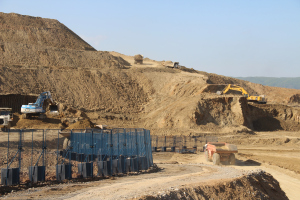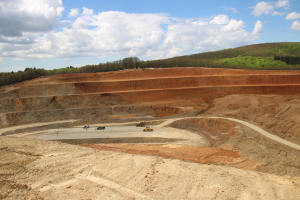The dysfunction of Greece’s government is on full display in Chalkidiki, where the future of a major gold mining operation approved by the previous regime now hangs in the balance, pitting citizens hungry for jobs against environmentalists who fear lasting damage. By Claus Hecking for DIE ZEIT, translated by Handelsblatt Global Edition.
Chalkidiki - David Hume stands on a mountain near a 240-meter (787-foot) deep hole that is Greece’s largest goldmine. His company, Hellas Gold, is there to extract the precious metal after signing an agreement with the Greek government. Instead, he watches in amazement as government workers fill the same hole with garbage from a nearby construction site.
The leftist national government, s wept into power in the January, is refusing to let Mr. Hume’s miners store the garbage elsewhere. Mr. Hume shakes his head in disbelief: “We will need to get rid of all this material one day before the mine goes back into business.” But no one really knows if the mine, Greece’s largest and most controversial economic project to date, will ever begin operation.
wept into power in the January, is refusing to let Mr. Hume’s miners store the garbage elsewhere. Mr. Hume shakes his head in disbelief: “We will need to get rid of all this material one day before the mine goes back into business.” But no one really knows if the mine, Greece’s largest and most controversial economic project to date, will ever begin operation.
Once, this construction site was a symbol of new jobs and future wealth. Now, the open pit is a gaping sore in the Greek landscape, a monument to political failure and violence. What is occurring at the mine on the northern Greek island of Chalkidiki is a microcosm of what Greece is going through nationally, a nation in crisis torn by internal strife over a cloudy future.
The danger is great that few Greeks in the end will ever profit from the gold mine, leaving nothing but a massive pile of garbage for society to clean up. The new Greek government is torn by similar controversies over the tradeoff between economic development, a priority in Greece, and environmental and other regulations that in more prosperous days were tolerated, if not welcomed, as a sign of civil progress.
Eldorado, the parent company of Hellas Gold, promised to invest $1 billion (€899.5 million) in Chalkidiki to extract precious metals and has 600 employees working at the construction site. But since the far left-wing Syriza regime took control in Athens, everything is up in the air, including the mining project. The Syriza-led government recently announced it was recalling the mine’s permit and would review the circumstances that led to its award by the predecessor middle-left government.
Greece as an investment decision looks less predictable than ever
Questions raised by Syriza reflect the broader queries facing Greeks today. Should Greece exploit its natural resources and disregard environment concerns? Should the country protect its environment at the cost of losing jobs it desperately needs? The questions pit everyone against everyone else. Whatever decision the government eventually makes, Greece will be torn.
The gold mine was the pride of former prime ministers Giorgos Papandreou and Antonis Samaras, who sought to demonstrate the attractiveness of Greece to international investors and promised a brighter economic future. But since the election of Alexis Tsipras, the current Greek prime minister, the country appears to offer only political standstill and, increasingly, violence. Greece as an investment destination looks less predictable than ever. Chalkidiki offers a glimpse of what’s at stake for companies seeking to mine resources and those who fear environmental degradation.
Ioannis Verginis stands at the edge of a beautiful abyss. Birds fly over a long, green valley defined by a slender blue river lined with trees. He wonders what will become of the honey, olive oil and clean water from his region if the mine is allowed to proceed. “If the Greek government wins, this here will become a moonlike landscape,” he said, rejecting Mr. Hume’s assertion the mining rubble is not dangerous. “The stone here has a lot of asbestos minerals. And what happens when the rubble slides down somewhere, when we have an earthquake perhaps?”
It is true the gold mine has a checkered history and has raised many questions. The Greek government never publicly asked for bids and awarded the project to Hellas Gold, a company that had been created only three days before the award. The circumstances of the sale remain obscure. Greece’s deputy economics and finance minister, Christos Pachtas, a Social Democrat who later became mayor of Aristoteles, pushed for the sale. The family of an oligarch profited most from the sale. The family owned a major portion of Hellas Gold’s parent company, which was sold to Eldorado Gold for €1.8 million in 2011. The high price was the result of a political decision by the preceeding Social Democratic government, which had previously prohibited the mine from being exploited.
We will protect our country from outside investment at any price.“ Antonis Samaras, former Greek Prime Minister
The deal was so miserable for Greece that the European Commission ordered the company to pay the government €15.34 million in damages for skirting the law. The mining company appealed in court. So did the Papandreou government. Even though it was broke, the government told the court it didn’t want the money under any circumstances. Syriza used the issue to its advantage. Several times, Mr. Tsipras visited Aristoteles, where the fight between environmental activists, mountain people and country and mine villages escalated into threats and violence.
In February 2013, armed men wearing masks stormed the premises of Hellas Gold. They overpowered two security guys and splashed them with gasoline, threatening to burn them alive. They set trucks, machines and office equipment on fire before fleeing. The attack brought a harsh reply from the government. Police troops stormed the village of Iérissos and used tear gas against the protesters. “We will protect our country from outside investment at any price,” said Mr. Samaras, the conservative Greek prime minister.
Hellas Gold says the accusations of unfair competition are untrue. “We follow the rules exactly,” said a spokesman, Kostas Georgantzis. Miners know the company is on their side. Some 5,000 supporters traveled to Athens in April to demand their continued employment. In the part of central Macedonia where the mine is located, the jobless rate is almost 28 percent.
The Greek government say it will make a decision on the future of Skouries mines within the next two months. It will be a tough decision that won’t please everyone. Either Syriza will feel betrayed, or Greece will become a scarier place for outside investors. The government is doing with the mines what it did with the euro. It must negotiate terms that legally recognize and honor the promises they made previously with outside lenders and investors.
Only one thing is certain: There won’t be peace in Chalkidiki any time soon. “We will not emigrate,” declares a statement painted on the facades of buildings by pro-mining backers in the small mountain village of Paleochori. “Fight until the end for growth and progress.” But in the seaside village of Ierissos, posters scattered around town carry a very different message: “You can wait for a long time until we will surrender. We will not do it at any moment.” 
